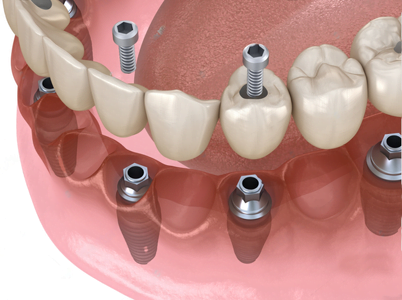Introduction: Understanding Dental Implants
Dental implants have emerged as a groundbreaking solution for individuals seeking a durable and natural-looking replacement for missing teeth. Unlike traditional dentures, dental implants involve the surgical implantation of titanium posts into the jawbone, creating a solid foundation for artificial teeth. This article aims to guide you through the essential aspects of dental implants, ensuring you are well-informed before embarking on this transformative journey.
1. What are Dental Implants?
Dental implants are sophisticated dental prosthetics designed to replace missing teeth. The core component of a dental implant is a titanium post, surgically positioned into the jawbone to serve as an artificial tooth root. This post integrates with the natural bone over time through a process called osseointegration, providing a stable and permanent base for attaching crowns or dentures. The result is a restoration that not only looks and feels natural but also functions like a real tooth.
Understanding the intricacies of dental implants goes beyond the cosmetic aspect. The integration with the jawbone prevents bone loss, maintaining facial structure and preventing adjacent teeth from shifting. This holistic approach to oral health sets dental implants apart as a comprehensive and lasting solution.
2. Who Needs Dental Implants?
Dental implants are a versatile option for individuals dealing with tooth loss due to various reasons. Whether caused by trauma, decay, or congenital issues, dental implants offer a reliable solution. Candidates for dental implants typically include those looking for stability, functionality, and a seamless integration with their natural teeth.
It’s essential to consider dental implants not only for their aesthetic benefits but also for their impact on overall oral health. Beyond improving the appearance of your smile, dental implants contribute to better chewing functionality and support the health of surrounding teeth and gums.

3. Who Can’t Get Dental Implants?
While dental implants are a suitable option for many, certain health conditions and circumstances may impact eligibility. Individuals with uncontrolled diabetes, for example, may face challenges in the healing process, affecting the success of implant integration. Additionally, extensive jawbone loss may require preliminary procedures, such as bone grafts, to ensure a stable foundation for the implants.
Consulting with a dental professional is paramount to determine individual suitability for dental implants. A thorough examination of your oral health, medical history, and any potential risk factors will guide the decision-making process, ensuring the best possible outcome.
4. How Long Do Dental Implants Last?
One of the remarkable aspects of dental implants is their longevity. With proper care and maintenance, dental implants can last a lifetime. Regular dental check-ups, diligent oral hygiene practices, and avoiding habits like smoking contribute significantly to their durability.
The key to the long-term success of dental implants lies in the commitment to maintaining overall oral health. Routine dental examinations allow early detection of any potential issues, while good oral hygiene practices, including regular brushing, flossing, and professional cleanings, ensure the health of the implant and surrounding tissues.
5. Does it Hurt to Get Dental Implants?
Concerns about pain are common when considering dental implant surgery. However, the procedure itself is performed under local anaesthesia, ensuring minimal discomfort. The surgical process involves making an incision in the gum to expose the jawbone, where the titanium implant is then securely placed.
Post-surgery, patients may experience mild pain, swelling, and bruising, which can be managed with prescribed medications. The discomfort is temporary, and your dental team will provide detailed post-operative care instructions to guide you through the recovery process.
Understanding and addressing any concerns about pain beforehand is crucial for a positive experience. Open communication with your dental professional ensures that you are well-prepared and confident in your decision to undergo dental implant surgery.

6. What to Do Before Dental Implant Surgery?
Preparation for dental implant surgery involves several essential steps to ensure a smooth and successful procedure. A comprehensive dental examination is conducted to assess the overall health of your teeth and gums. This includes X-rays to evaluate the condition of the jawbone and identify any potential issues that may affect the implantation process.
In addition to the dental examination, discussions about your medical history are crucial. Providing accurate information about existing health conditions, medications, and lifestyle factors allows the dental team to tailor the treatment plan to your specific needs.
Pre-surgery instructions may include dietary adjustments, such as avoiding certain foods or fasting before the procedure. This ensures a favourable environment for surgery and reduces the risk of complications. Depending on your individual case, additional medical evaluations may be necessary to address any potential concerns and optimise your overall well-being before undergoing dental implant surgery.
7. What to Do After Dental Implant Surgery?
Post-operative care is a crucial aspect of ensuring the success of dental implant surgery. Following the procedure, you will receive detailed instructions from your dental team to guide you through the recovery process. Adhering to these guidelines is essential for minimising discomfort, promoting healing, and achieving optimal results.
Immediately after surgery, it’s common to experience some swelling, bruising, and mild pain. Applying ice packs and taking prescribed medications as directed can help manage these symptoms. It’s important to rest and avoid strenuous activities in the initial days following surgery to facilitate proper healing.
Maintaining good oral hygiene is paramount during the recovery period. Your dental team will provide specific instructions on how to care for the surgical site. Attend scheduled follow-up appointments to monitor the healing progress and address any concerns promptly.

8. What Can I Eat After Dental Implant Surgery?
Dietary considerations play a significant role in the postoperative period to support healing and minimise discomfort. Immediately following dental implant surgery, a soft diet is recommended to avoid placing excessive pressure on the surgical site. This may include foods like soups, mashed potatoes, yoghurt, and smoothies.
As the healing progresses, you can gradually reintroduce firmer foods into your diet. However, it’s essential to avoid hard, crunchy, or sticky foods that could potentially disrupt the healing process or damage the implants. Following your dental team’s guidance on dietary restrictions ensures a smooth recovery and enhances the likelihood of a successful outcome.
Nutrient-rich foods are particularly beneficial during the recovery phase, as they contribute to overall health and aid in the healing process. Maintaining proper hydration is also crucial, promoting optimal healing and minimising the risk of complications.
Conclusion: A Lasting Smile with Dental Implants
In conclusion, dental implants stand as a transformative solution for individuals seeking a permanent and natural-looking smile. Beyond their cosmetic benefits, dental implants contribute to improved oral health, functional restoration, and long-term stability. Understanding the intricacies of the procedure, preparing diligently, and following post-operative care instructions are critical steps toward a successful and lasting outcome.





